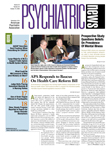Numerous studies have revealed correlations between psychoactive substance use and other factors, but few have charted the underlying links from genetics to church going, childhood upbringing, and adult experience.
In the latest of his many studies of several populations of twins, Kenneth Kendler, M.D., shows how genes and environment influence church attendance and use of alcohol and nicotine from childhood to adulthood.
Kendler is the Rachel Brown Banks Distinguished Professor of Psychiatry and director of both the Psychiatric Genetics Research Program and Virginia Institute for Psychiatric and Behavioral Genetics at the Virginia Commonwealth University School of Medicine in Richmond.
When the twins in their study were young, they were most strongly influenced by common parental and community expectations regarding church attendance, wrote Kendler and John Myers, M.S., in the October American Journal of Psychiatry. That influence virtually disappeared in adulthood, when genetic influences on personality largely led to decisions about going to church, with environmental factors not shared by the other twin playing an important secondary role.
The new study included data from 1,795 Caucasian male twins in the Virginia Adult Twin Study of Psychiatric and Substance Use Disorders. They were born from 1940 to 1974 and were interviewed in two waves, 1993-1996 and 1994-1998. Included were 469 monozygotic pairs and 287 dizygotic pairs. Over the course of several interviews, researchers asked the twins about current and past attendance at church or other religious services, how much and how often they drank alcohol, and the average number of cigarettes a day (if any) they smoked.
Using sophisticated statistical models, Kendler and Myers found the proportion of variance among the twins at ages 8 to 11, 12 to 14, and 15 to 17 and as adults with an average age of 40. They looked at three explanatory factors: additive gene effects, shared environmental effects, and individual-specific environmental effects.
In the youngest age group (8 to 11) and in early adolescence (12 to 14), shared environment explained 50 percent of individual differences in church attendance, a figure that dropped slightly to 41 percent in late adolescence (15 to 17). However, the effect of that shared childhood environment accounted for only a statistically insignificant 3 percent for the twins in adulthood.
Meantime, the role of heritability in church attendance was 21 percent, 25 percent, and 38 percent over the three younger age ranges, but rose to 58 percent among the adults. Individual-specific environmental effects were fairly stable in youth, from 21 percent to 28 percent, but accounted for 41 percent of church attendance among the adults.
Kendler and Myers next looked at the correlation between church attendance and use of alcohol or tobacco. They hypothesized that church attendance served as a marker for a constellation of negative attitudes toward alcohol and tobacco use among the largely Protestant (85 percent) study participants.
Alcohol use at ages 12 to 14 was almost entirely (88 percent) due to a shared environment. That proportion dropped to 51 percent in late adolescence and to zero in the adults. Genetic factors were miniscule in early adolescence (7 percent), rose to 49 percent in late adolescence, and 62 percent among adults. Individual-specific environmental factors for the church attendance/alcohol relationship were miniscule in youth but rose to 38 percent in adulthood.
The shared childhood environment also accounted for most of the level of nicotine consumption at both stages of adolescence, with only a slight genetic contribution. However, in adulthood, genetic factors accounted for 85 percent of the correlation with church attendance, with the rest due to the individual-specific environment.
“[A]s individuals age, they increasingly shape their own social and religious behavior in large part through their genetically influenced temperament,” wrote Kendler and Myers.
Thus, more than parents' wishes or advice, personal temperament—mainly influenced by their offsprings' genetics—directed the twins' choices in post-adolescent life: college, careers, new friends, romantic partners. Those environmental factors in turn played a role in everything from church attendance to smoking and drinking.
That understanding may ultimately have some clinical value, they suggested.“ [T]he pattern of findings uncovered in these analyses can help inform our efforts to prevent and reduce harmful consumption of psychoactive substances.”
